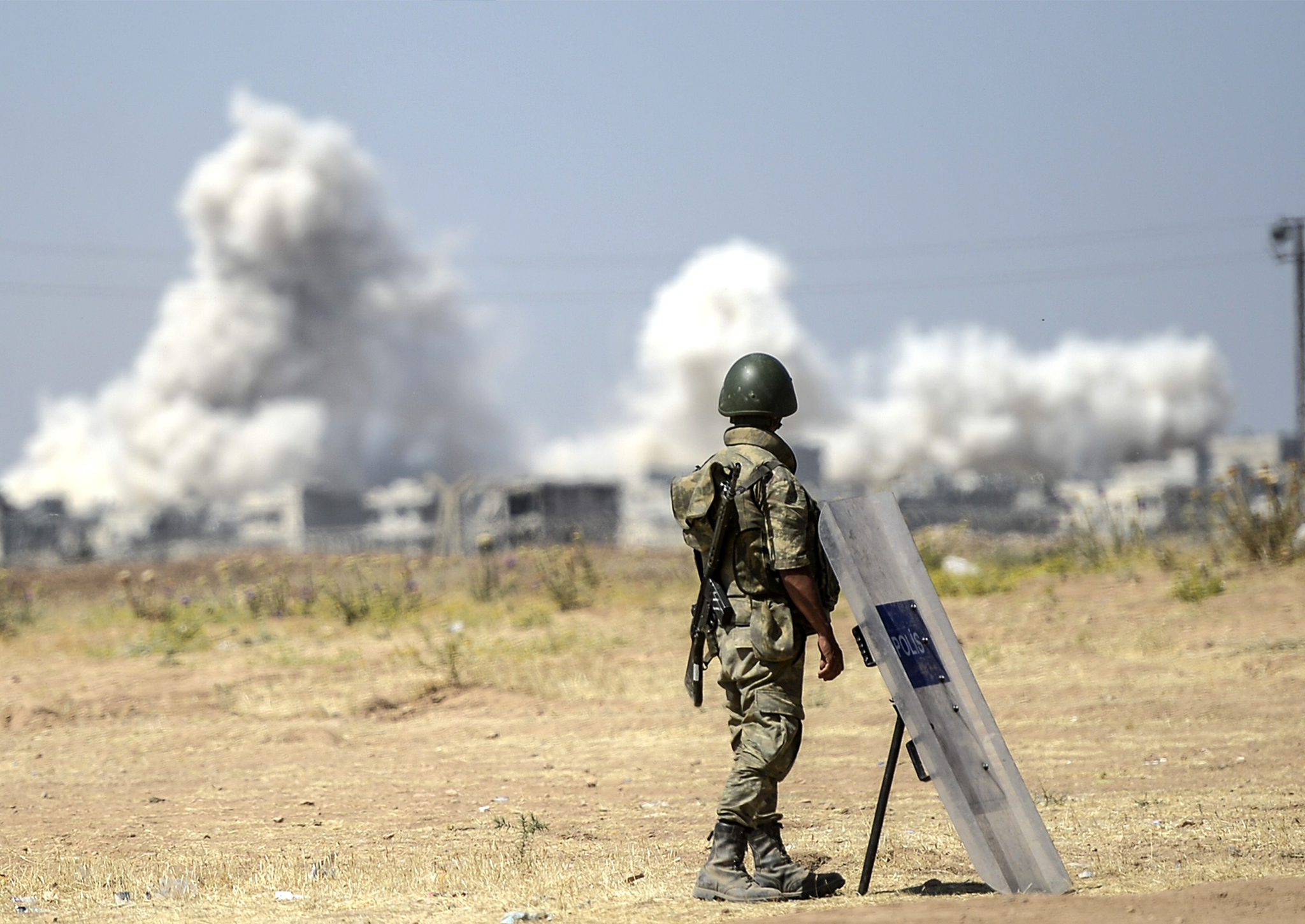Turkey's bombing campaign in Syria and Iraq is the last thing we need in the fight against Isis
President Erdogan is trying to destroy one of the rare success stories of the Syria conflict

Your support helps us to tell the story
From reproductive rights to climate change to Big Tech, The Independent is on the ground when the story is developing. Whether it's investigating the financials of Elon Musk's pro-Trump PAC or producing our latest documentary, 'The A Word', which shines a light on the American women fighting for reproductive rights, we know how important it is to parse out the facts from the messaging.
At such a critical moment in US history, we need reporters on the ground. Your donation allows us to keep sending journalists to speak to both sides of the story.
The Independent is trusted by Americans across the entire political spectrum. And unlike many other quality news outlets, we choose not to lock Americans out of our reporting and analysis with paywalls. We believe quality journalism should be available to everyone, paid for by those who can afford it.
Your support makes all the difference.Turkey’s president, Recep Tayip Erdogan, is playing a dangerous game of divide and conquer, both at home and in the region. Having spent the best part of the conflict in Syria acquiescing to Isis – which has been using Turkish territory as a transit point into Syria, and using it to build a lucrative commercial hub – Turkey has started targeting the jihadis in Syria.
However, Turkey has also started bombing the Kurdistan Workers’ Party (PKK) and its bases in Iraq and Syria. This could be disastrous for the international community’s efforts to defeat Isis given that, while Turkey has been mostly a hindrance in the war on Isis, the PKK, and its sister-group, the Democratic Union Party (PYD), has been the most effective anti-Isis fighting force on the ground in Syria.
Many believe Turkey’s targeting of Isis is only a pretext for its efforts to suppress the PKK, which has fought the Turkish state for a combination of territorial, political and human rights for Turkey’s beleaguered 20 million Kurds. As Nato meets today to discuss Turkey's military campaign against Isis and the PKK, it will have to consider whether it wants to be sucked into Turkey’s toxic domestic politics.
Erdogan emerged from Turkey’s recent elections weaker and without a majority. That election also saw the Peoples’ Democratic Party (HDP) – a Kurdish party that has historic ties to the PKK – enter Turkey’s parliament for the first time. The HDP’s historic success represented a milestone in Turkey’s relationship with its Kurds and suggested that the country and its Kurdish issue was moving forward.
Erdogan may be hoping that attacking the PKK – and stoking anti-Kurdish sentiments among Turks – will bring him the majority he needs in a potential snap election. Erdogan has also all but dismissed the possibility of peace, and has even gone as far as suggesting that the HDP, which won overwhelming support from Turkey’s Kurds, and indeed Turks, could be prosecuted for having ties to the PKK.
Such a stance contrasts starkly with current regional dynamics that have been largely in favour of the Kurdish groups. With its disciplined fighters, the pro-West and secular PYD has been successfully combating Isis ever since it emerged onto the scene, including during the formative stages of Isis’s emergence, when it was still a relatively unknown force.
The PYD is also the de-facto government of Syria’s north-eastern, and comparatively stable autonomous Syrian Kurdistan region, one of the rare success stories of the devastating conflict in Syria.
Erdogan and the Turkish state may assert the PKK and Isis are indistinguishable. Yet, that stands at odds with the position adopted by the international community and public opinion. The PYD and PKK have fought hand-in-hand with Western forces against Isis and are recognised as a crucial partner in the war against the jihadis.
While the PKK has negotiable objectives, Isis does not. The latter seeks the surrendering of fundamental human rights, values of tolerance, pluralism and integration. The former, as we know too well, does not.
Although Turkey’s war on Isis should be welcomed, it should not come at the expense of the Kurds. Erdogan himself has, in the past, dismissed the logic of airstrikes and incursions, on the basis that the PKK is a local problem and not a transnational one. The PKK is an indigenous Turkish organisation and has its principal support bases within Turkey, not across the borders in Syria and Iraq.
Airstrikes have helped degrade Isis over the past year but it has been ground forces, like the PKK/PYD in Syria or the Peshmerga and Shia militias in Iraq that have stunted Isis and prevented it from exploiting ungoverned areas or weak and impoverished populations. In other words, it is only ground troops that can defeat Isis. Given that Turkey has launched countless cross-border deployments over the decades, its most recent campaign against the PKK is yet another exercise in futility. And endorsing Turkey’s attacks on both Isis and the PKK is counter-intuitive to the extreme.
If it's genuinely committed to peace and stability, the West must encourage Turkey to go back to the peace process with the PKK and work with the HDP. It is only through meeting the democratic demands of Turkey’s Kurds, confronting Isis and preventing the jihadis from using Turkey territory to repair and rebuild that Turkey can achieve stability at home.
Join our commenting forum
Join thought-provoking conversations, follow other Independent readers and see their replies
Comments